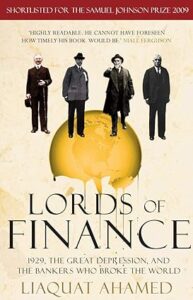World finance: What is it and why is it important?
The term “world finance” refers to a broad category that includes every aspect of global financial activity. This includes everything from the transfer of money and other assets between nations to the control and supervision of global financial markets.
The smooth functioning of the global economy depends on world finance. It enables people to invest in their future, governments to finance spending, and companies to raise money for development.
if you learn more about world finance to watch this video.
Why is world finance important?
World finance is important because it makes it possible to effectively distribute capital and resources across national borders. It supports development and economic progress.
For example, a corporation in one country can easily raise money from investors in other countries if it has a new investment opportunity. This helps businesses to grow and generate employment.
Reduction of inequality and poverty is also facilitated by global finance. For example, international financial institutions lend money to developing countries so they can develop their infrastructure and enhance their health care and education systems.
if you learn more about world finance. so please buy a world finance book to get more knowledge
Challenges facing the world financial system
Following are some of the difficulties faced by the world financial system:-
Globalization:-
Globalization is the process of increasing interdependence and connectivity between different countries and economies which is known as globalization. It is influenced by many things, including developments in communications, transportation and technology.
Both good and bad effects of globalization can be identified. On the one hand, it has improved living conditions for large numbers of people around the world and contributed to greater economic growth and development. Additionally, it has helped promote understanding and cultural exchange.
However, globalization has also been blamed for increasing inequality, loss of jobs in some countries, and environmental damage. Additionally, it has increased the world’s sensitivity to pandemics and financial shocks.
Some examples of globalization are:
A company in the United States outsources its customer service to a call center in India.

Volatility:
The state of not being stable, balanced or predictable is called instability. It can refer to things, situations or persons.
For example, a chair with broken legs is unstable because it is prone to tipping over. An unstable political or economic system is more likely to experience sudden and unexpected changes. A person who is emotionally unstable may behave erratically and have mood swings.
Many changes, both internal and external, can cause instability. Weaknesses within a structure or system are examples of internal forces. Shocks or disruptions such as natural disasters, economic recession, or political crisis are examples of external forces.
The negative effects of instability can be many. This can lead to conflict, anxiety and uncertainty. It can also harm economic growth and development.
inequality
Inequality is the unfair distribution of resources, opportunities, and outcomes among different groups of people. Income, wealth, color, ethnicity, gender, sexual orientation, disability, and social class are some of the variables that can be taken into account.
Inequality can have many negative consequences, including:
- lack of economic growth
- low standard of living for the poor
- Increase in crime and violence
- Social unrest and political instability
- poor health outcomes
- low educational attainment
- decreased social mobility
There are several ways to reduce inequality, including:
- progressive taxation
- social safety net
- Equal access to education and health care
- Anti-discrimination laws and policies
- Investing in disadvantaged communities
Following are some essential elements of world finance:

International Trade and Investment:
International trade is the exchange of goods and services between different countries. It is based on the principle of comparative advantage, which holds that nations should import those goods and services at which they are generally less effective in producing and specialize in the production of those goods and services at which they are most efficient. Are there. As a result, living standards may rise and countries may consume more goods and services than they could produce alone.
Transferring money from one country to another is known as international investment. This can come in the form of portfolio investment, which is made by individuals or companies in financial assets, or foreign direct investment (FDI), which occurs when a firm invests in a business in another country.
- Foreign exchange: Foreign exchange rates are determined by supply and demand. The demand for a currency is determined by many factors, such as the health of the economy, the state of interest rates, and the stability of the political system. The government’s central bank controls the money supply and can manipulate its value by printing money or selling foreign exchange reserves.Since there is no single exchange where currencies are traded, foreign exchange markets are decentralized. Rather, banks and other financial institutions engage in over-the-counter (OTC) currency trading.
This increases the efficiency of the foreign exchange market but can also make it challenging to obtain accurate pricing information.
-
- financial markets: Financial markets are markets where financial assets are traded. Stocks, bonds, currencies, commodities and derivatives are some examples of these assets. Because they give companies and investors the means to raise capital, financial markets are essential to the functioning of the world economy because they enable governments to finance spending.Primary market and secondary market are the two primary categories of financial markets. New financial assets are issued and sold in primary markets. For example, in a primary market offering, a business may sell common shares of its stock to the public. Existing financial assets are traded by buyers and sellers in secondary markets.

-
- Share Market: Share market is the place where shares are traded. Stocks are shares of ownership in a company. Investors buy stock in the hope that the company will grow and the value of their shares will increase.
Bond Market: The bond market is where bonds are traded. Bonds are loans that investors make to governments or companies. Investors buy bonds in the expectation of receiving regular interest payments and getting their money back when the bond matures.
Foreign Exchange Market: The foreign exchange market is where currencies are traded. Investors buy and sell currencies for many reasons, such as traveling to other countries, investing in foreign assets, or hedging risk.
- Share Market: Share market is the place where shares are traded. Stocks are shares of ownership in a company. Investors buy stock in the hope that the company will grow and the value of their shares will increase.
Commodity Market: Commodity market is the place where goods are traded. Commodities are raw materials, such as oil, gas and wheat. Investors buy and sell commodities for a variety of reasons, such as to hedge against inflation or to speculate on future prices.
if you learn more about world finance by book to click this link
 if you learn more about world finance by book to click this book
if you learn more about world finance by book to click this book
Derivatives Market: Derivatives market is where derivatives are traded. Derivatives are contracts that are based on the underlying value of another asset, such as a stock, bond or commodity. Investors buy and sell derivatives for many reasons, such as to hedge against risk or to speculate on future prices.
international financial institutions
International financial institutions (IFIs) are organizations that provide loans to countries and businesses, and that help regulate the global financial system. IFIs, which are usually controlled by multiple countries, are important for promoting the growth and expansion of the world economy. If you want to learn more about world finance.

Some of the most famous IFIs include:
- world Bank
- International Monetary Fund (IMF)
- Bank for International Settlements (BIS)
- Asian Development Bank (ADB)
- European Investment Bank (EIB)
- Inter-American Development Bank (IDB)
- African Development Bank (AfDB)
IFI provides a variety of services, including:
- Loans and grants to countries to support economic development projects
- Technical assistance and policy advice to countries and businesses
- Financial market regulation and supervision
IFIs play an important role in assisting countries in:
- Finance economic development projects such as infrastructure, education and health care
- Respond to financial crises and natural disasters
- Promoting financial inclusion and access to world finance
if you are learn more about world finance click here
